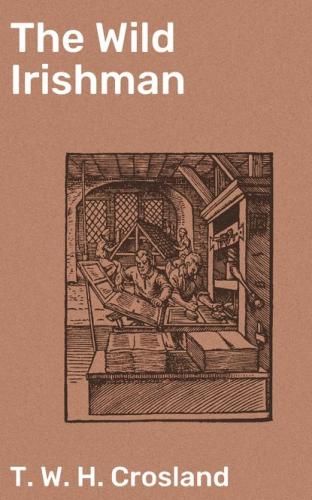T. W. H. Crosland
The Wild Irishman
Published by Good Press, 2019
EAN 4064066150679
Table of Contents
PREFACE TO THE AMERICAN EDITION
PREFACE TO THE AMERICAN EDITION
The people of America may or may not indulge kindly views of the Irish community; but there cannot be the slightest question that the Irish of Ireland have kindlier feelings for America than ever they have had for England. To the Irish of Ireland, in fact, America has long stood in the relation of a sort of promised land, and they have a habit of turning their thoughts thitherward even when small matters are concerned. There is a tale of an elderly lady of Galway who, on being informed by her medical attendant that it was desirable that she should consult a dental specialist, set forth incontinently for New York to the total neglect of London. She believed that of the two places, New York was the friendlier. I am informed that, broadly speaking, New York is policed by Irish Americans and that the American Irishman makes a rather useful subordinate municipal official. Be this as it may, there can be no doubt that very considerable numbers of Irishmen contrive to do themselves a great deal better in the United States than they could ever have hoped to do in their own native Erin. To those Americans and American Irish who happen to be at all interested in the present condition and prospects of the green country, I venture to offer the following pages for what they are worth.
T. W. H. C.
THE WILD IRISHMAN
CHAPTER I
DISTRESSFUL
The person who invented the Irish question may or may not deserve well of his species. In a sense, of course, there has been an Irish question since the beginning of history. But it is only within the last century or so that we have begun to spell it with a big Q. That big Q perhaps attained its largest proportions during the eighties of the last century, and associated, as it usually was, with a capital G, which stood for Gladstone, and a capital P, which stood for somebody else, it certainly did yeoman service wherever a use for letters could be found. At the time of Mr. Gladstone’s Home Rule campaign the existence of a highly insistent Irish question could not be doubted. A good deal of water has flowed under the bridges since then, however, and at the present moment, and in view of the present situation of Irish affairs, one is tempted to wonder whether there now exists, or whether there really has ever existed, an Irish question with a big Q at all. It is true that at the time of writing there is an actual and undesirable famine raging in Connemara. It is true that the population of the country is on the decline, and that the standard of comfort among the people will not bear comparison with the standard of comfort in any other country in the world, unless it be in the poorer and bleaker regions of Kamchatka; and it is true also that Irishmen as a body continue to exercise themselves both at street corners, and on all sorts of platforms, in a habit of rhetoric, which many years of shouting have made second nature with them. For all that, the Irish question as a portentous and vital matter appears to be somewhat played out. One may safely say that in Ireland, at any rate, it has been reduced to an obscurity which allows of its being now spelled with about the smallest “q” in ordinary use among printers. In England it has been allowed to disappear, in favor of the Russo-Japanese War, Protection, and Do We Believe? On the whole, though it no doubt harrows the souls of the horde of carpet-baggers which have come to us out of Ireland, this condition of affairs is exceedingly salutary for Ireland itself. Now that the factions, and the tumult, and the turbulence, and the wrangling have died down, or at least been in large measure abated, the facts about Ireland are for the first time in history beginning, as it were, to swim into our ken. We are beginning to perceive, for example, that out of the quarrels and bloodshed of the past hundred years Ireland has emerged triumphant. It has been a case of a bankrupt, downtrodden and dwindling people’s fight against a rich and powerful dominant people, and the weaker side has proved clearly that in the long run God is on the side of “justice.” To all intents and purposes Ireland is at the present moment in full possession of all that she herself has felt it reasonable to demand. She has the franchise, she has land laws which are almost socialistic in the benefits
